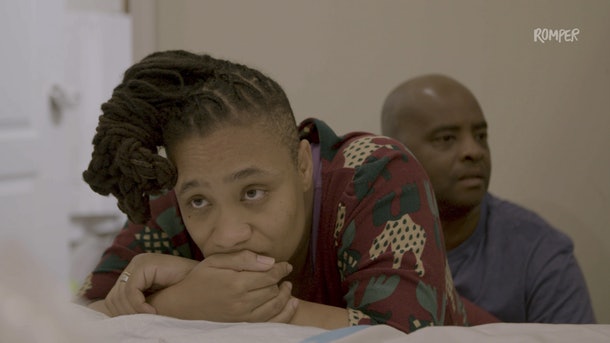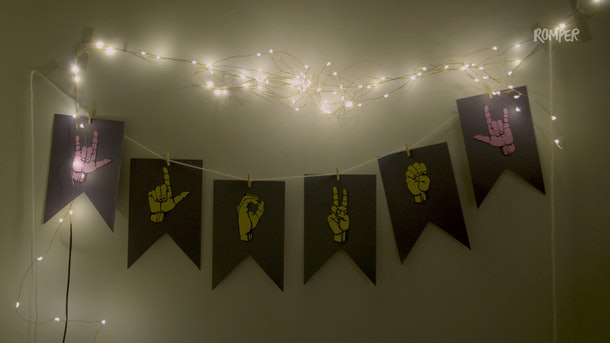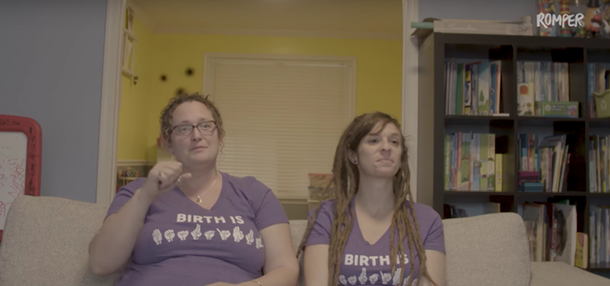By Lisa A. Goldstein
18 December 2018
Romper
[EDITOR’S NOTE: Brittany Frank Noschese is Jewish Deaf. Her parents and her children are also all Deaf.]
Ally Balsley and Brittany Noschese met at the elementary school where their firstborns were classmates. They have three kids each and their birth settings were in the same order: First they delivered in a hospital, next in a birth center, and then at home. Their experiences were life-changing in different ways, with the same end result: They decided to train as doulas. They now co-own a business called Hand Waves Birth Services, which serves the Washington DC area in a special niche, that of deaf doulas who communicate with their hands and provide hands-on support. They were even each other’s doulas for their third births.
Both women are Deaf and communicate via American Sign Language (ASL); the capital-D refers to this category of deaf people who consider themselves part of Deaf Culture (unlike deaf people who speak and read lips). Balsley requested an ASL interpreter for her first birth. The interpreter was with her nearly the entire time – more than 36 hours in total. As a result, she refers to this interpreter as “so much more than just an interpreter,” because she helped make the birth experience more positive. At the time, Balsley didn’t know what a doula was, but during her second pregnancy, she tried to find a doula who knew ASL. The stressful and unsuccessful search led her to become a doula to ensure that no other Deaf individuals would experience the same frustration. Together, they helped a Deaf mother, Niesha, through her birth in episode 4 of Romper’s “Doula Diaries,” season 2, which you can watch below. Niesha’s birth story illustrates the importance of communication during labor, and the crucial role doulas play in advocating for their clients.
Noschese didn’t have an interpreter at any of her three births. At her first birth, her chosen interpreter slept through the phone call letting her know that labor was starting. As a result, Noschese lacked resources during and after her birth – no one talked to her about what she should be looking for, or what kind of information she should have regarding breastfeeding, birth, or postpartum depression, so Noschese had no idea where to start. “I learned the hard way,” she tells Romper, “by facing them while they were happening … I had no clue that my frustration and emotions during postpartum were normal and that I was not alone.”
There was no funding for an interpreter for Noschese’s successive births. She decided to choose her own birthing location regardless of an interpreter being available, and says she’s fortunate that the midwives and nurses who assisted her went beyond her expectations. They wrote everything down, gestured when necessary, and made sure she was up to date on what was happening. She admits this might not be for everyone.
“It’s not fair that as a Deaf person, we sometimes face these decisions where we have to choose accessibility versus location of birth,” she says. Her experiences inspired her to become a doula to help other families like hers.
Labor can be difficult, and even more so when communication challenges are present. These can include getting superficial information from medical providers, with some details not being shared. This results in the inability to make informed choices. Or there’s the scenario where medical providers talk to the interpreter or others in the room instead of the deaf person directly. Some places can’t even provide or afford ASL interpreters, further limiting the choices of where to give birth.
With Deaf doulas, the families they serve have direct access to communication in their language. “They can be confident that they have someone on their birth team who knows the culture wholeheartedly,” the women say. “With us, their families are not Deaf persons, they are individuals, and are seen for who they are, not their hearing status.”
Not all families Balsley and Noschese serve are Deaf. Some are hearing with deaf partners and vice versa, but most communicate through ASL. Deaf individuals tend to be more visual and tactile, so whether they sign or not, they’re asked about their personal communication and touching preferences, especially in scenarios where they might close their eyes – like rubbing the person’s arm as a signal to stop pushing, tapping the arm to start pushing again, giving an arm squeeze if someone enters the room. When deaf people close their eyes, this essentially cuts them off from communication, so touch becomes important.

Photo: In episode 4, season 2 of Romper’s “Doula Diaries,” Niesha enlists Brittany and Ally to assist her through her second birth. Sneha Anthony.
“We develop our own touching signals for certain scenarios,” they say. “[Being a doula] does not always require words, so we touch to communicate what is happening around them. We definitely touch for reassurance and comfort as well.”
Because Balsley and Noschese are Deaf, they know firsthand what their clients need. “We value accessibility and inclusivity, and are committed to advocacy,” the women explain. “We understand the deaf experience. We know exactly what they need and appreciate such as eye contact, “deaf space,” and we have knowledge of interpreter use, importance of lighting in rooms, and more.” Deaf people need lights to be able to read lips or see each other signing.
Accessibility and advocacy have everything to do with birth, assert Balsley and Noschese. Each person deserves to be treated like a human being. This means receiving complete information, questions answered in detail, and feeling empowered. They consider it their mission to let families know what their rights are and how important it is to have access to all information and resources – not just having them simplified or explained superficially. “Only they can make decisions for themselves, not their providers, interpreters, anyone else, just them,” they say.
Their business name refers to the way Deaf people applaud – by waving their hands high in the air. “This gives us visual access,” Balsley and Noschese say. “Our services provide full visual access.” The name has additional meaning, with waves being their preferred word for contractions, which are like waves that bring us closer to shore, just like waves of contractions bring us closer to baby’s arrival. Indeed, the website describes them as building bridges between the Deaf community and birthing world by making it accessible in ASL, one wave at a time.

Photo: Sneha Antony
The hope is that being featured in Season 2 of Romper’s “Doula Diaries” will show the world that deaf individuals experience pregnancy, birth, and postpartum just like everyone else. “Yes, deaf people can drive, yes, deaf people have sex, yes, deaf people give birth!” Balsley and Noschese say. “This episode also shows that accessibility and inclusivity in the birthing world is essential, and as Deaf doulas, we are here to make a difference.”
After a very frustrating first birth experience, this Deaf mother wanted a change. Will the help of two Deaf doulas give the quality communication and birth experience this mom wants and deserves? Watch Episode Four of Romper’s Doula Diaries, Season Two, below, and visit Bustle Digital Group’s YouTube page for more episodes, launching Mondays in December.





